

CYMATICS: Science Vs. Music - Nigel Stanford. Letting Go of a Relationship…That Doesn’t Exist. Cultivating Global Strategic Fantasies of Choice. 14th November 2010 | Draft Learnings from Islamic Al-Qaida and the Republican Tea Party movement IntroductionReality and existence Non-existence of Al-Qaida?
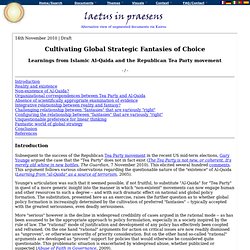
Organizational correspondences between Tea Party and Al-QaidaAbsence of scientifically appropriate examination of evidence Integrative relationship between reality and fantasy? Challenging relationship between "fantasies" that are variously "right"Configuring the relationship between "fantasies" that are variously "right" Unquestionable preference for linear thinking Fantastic world of global strategyConclusionReferences Introduction Subsequent to the success of the Republican Tea Party movement in the recent US mid-term elections, Gary Younge argued the case that the "Tea Party" does not in fact exist (The Tea Party is not new, or coherent.
More innocently perhaps is the manner in which disciplines and consultancies develop "models" through which to articulate reality and to enable policies for its navigation. Dealing with OCD. Obsessions are very intrusive and distressing thoughts or images that go well beyond the content of worries.
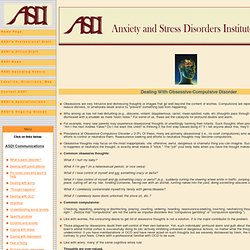
Compulsions are repetitive actions or thoughts that are done to reduce distress, to ameliorate doubt and/or to "prevent" something bad from happening.Who among us has not had disturbing (e.g., obscene, violent, blasphemous, racist, mean-spirited, rude, etc.)thoughts pass through our minds? For most of us, these are dismissed with a shudder as mere "brain noise. " For some of us, these are the catalysts for profound doubts and alarm.For example, many new parents may experience obsessional thoughts of unwittingly harming their infants.
Such thoughts often provoke intensely irrational alarm and shame: "Am I the next Andrea Yates? Do I not want this child? Psychotherapy of obsessive-compulsive disorder and spectrum: Established facts and advances, 1995-2005.Neziroglu F, Henricksen J, Yaryura-Tobias JA.Psychiatric Clinics of North America, 2006 Jun;29(2):585-604. OCD ONLINE - Strategies for managing OCD's Anxious Moments. Overcome OCD: Recovery tips for Obsessive Compulsive Disorder. Obsessive Compulsive Disorder can be a difficult, confusing experience.
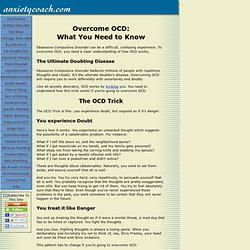
To overcome OCD, you need a clear understanding of how OCD works. The Ultimate Doubting Disease Obsessive Compulsive Disorder bedevils millions of people with repetitive thoughts and rituals. It's the ultimate doubter's disease. Overcoming OCD will require you to work differently with uncertainty and doubts. Like all anxiety disorders, OCD works by tricking you. The OCD Trick The OCD Trick is this: you experience doubt, but respond as if it's danger. You experience Doubt Here's how it works. What if I left the stove on, and the neighborhood burns? These are thoughts about catastrophes. And you try. You treat it like Danger You end up treating the thought as if it were a mortal threat, a mad dog that has to be killed or captured. How to Cope With Obsessive Compulsive Disorder: 14 Steps. Edit Article Edited by Rob S, Ben Rubenstein, Trackstar24, Julia Maureen and 18 others Are you constantly checking to see if your homework is done, lights are off, and doors locked?

Or are you pestered by inappropriate intrusive thoughts that you have to deal with by performing your special routine? This article has been written to help you deal with Obsessive Compulsive Disorder (OCD). Ad. 51KRRMHSAJL._SL500_AA300_ Facts About OCD. By M.

Williams, Ph.D. Obsessive-Compulsive Disorder (OCD) is a psychiatric mental disorder characterized by obsessive thoughts and/or compulsive behaviors that significantly interfere with normal life. Obsessions are unwanted, recurrent, and disturbing thoughts which the person cannot suppress and which can cause overwhelming anxiety. Compulsions are repetitive, ritualized behaviors that the person feels driven to perform to alleviate the anxiety of the obsessions.
67-toc-0001-m. Ocd-cycle.jpg (JPEG Image, 415???369 pixels) Obsessive Compulsive Disorder. Many neurodevelopmental conditions can often exist together, but each can be treated in different ways.
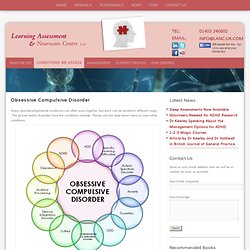
The picture below illustrates how the conditions overlap. Please use the drop down menu to view other conditions. Obsessive Compulsive Disorder, or OCD for short, is a chronic (long-term) mental health condition that is usually associated with obsessive thoughts and compulsive behaviour. It is regarded as a type of anxiety disorder. An obsession is an unwanted, intrusive thought, idea or image that repeatedly enters a person’s mind and results in anxiety.
For example someone may constantly worry that they have been contaminated by dirt or germs (obsessive thought) and then repeatedly wash their hands or shower/wash (compulsive behaviour) to try to ‘put right’ the distress and relieve the anxiety. Coping strategies. Hi everyone, I know that I have not been posting often and this has been a deliberate decision on my part.
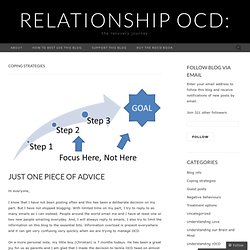
But I have not stopped blogging. With limited time on my part, I try to reply to as many emails as I can instead. People around the world email me and I have at least one or two new people emailing everyday. And, I will always reply to emails. On a more personal note, my little boy (Christian) is 7 months todays.